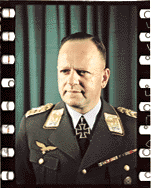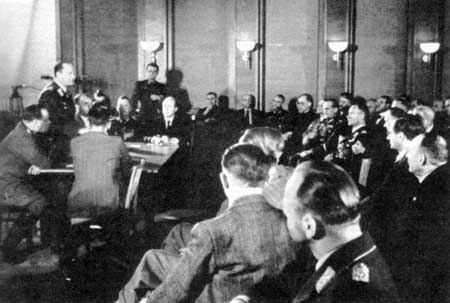[images and
captions added by this website]

London, March 14, 1974BOOKS The father of
the Luftwaffe - The
Rise and Fall of the Luftwaffe
- The
Life of Erhard Milch
- By
David Irving
- (Weidenfeld
& Nicolson, £5.95)
IF the Second World War was
indeed a struggle between dictatorship and
democracy, one would not guess which side was which
from the record of the Luftwaffe. All the
supposedly classic defects of democracy - divided
opinion, indecision, and blurred leader-ship - were
more evident in the German air command than the
British.  Field
Marshal Erhard Milch, named by both
Hitler and Adenauer as the man who
put a real German presence in the air, was
eventually born, down by muddle and intrigue, and
it was perhaps fortunate for the Allies that he
never achieved undisputed command of the Luftwaffe
(something that was at one time very much on the
cards, Göring or no Göring). Field
Marshal Erhard Milch, named by both
Hitler and Adenauer as the man who
put a real German presence in the air, was
eventually born, down by muddle and intrigue, and
it was perhaps fortunate for the Allies that he
never achieved undisputed command of the Luftwaffe
(something that was at one time very much on the
cards, Göring or no Göring).
David Irving shows how Milch, a Great War
veteran, went into civil aviation ia 1921, and used
every trick to circumvent the edicts of Versailles.
Having put Lufthansa emphatically into the skies,
Milch gave the Luftwaffe a flying start, enabling
the German aviation industry to sprout strong
military wings within a year of Hitler's accession.
By 1937 the pre-Nazi figure of 4,000 aircraft
workers had grown to 230,000. It seems that the German High Command never did
decide what the Luftwaffe was for. To the end of
the war the leadership was vague and divided about
the strategic concepts and purposes of the air
force. Were heavy bombers really needed (or were
bombs themselves needed in quantity, for Hitler had
ordered their production to cease after: the Polish
campaign)? What were the targets? Germany's
immediate neighbours? Russian industry? British
nerve centres? Even New York was on the visiting
list for a while. Were fighters primarily to
support ground forces, or to escort German bombers,
or to oppose enemy raiders? The mess the political
leaders got into with a war in the African sand, a
war in the Russian snow, an enduring Western front,
and Balkan excursions -- this mess was reproduced
with trimmings by the Reich Air Ministry. It says
much for the men who made and flew the German
machines that despite all vacillations, despite all
the corruption and inefficiency, the Luftwaffe, put
up such a formidable performance in every
theatre. Using the Field Marshal's hitherto concealed
diaries along with other sources, David Irving
demonstrates the true importance of Milch, and the
profound effect he could have had on the course of
the war if he had not been rendered almost
powerless for long periods by the jealousy of
Göring and Udet, the hostility of the
generals, and the opposition of aircraft designers
and manufacturers. Even so Milch became
increasingly the Luftwaffe's supremo after Udet's
suicide in 1941 and, before his own decline in
mid-1944 he had spurred German industry into
turning out fifteen times as many fighters as three
years earlier. 
Irving brings Milch to the centre of the stage
as a ruthless, imaginative patriot, narrow but not
without humour; a man who caused Britain grievous
injury, fought as soldierly a war as most, and
refrained from crying "Peccavi" in captivity. As Irving implies the Field Marshal could hardly
complain about humiliations in defeat since he had
been happy to accept applause in the day of
triumph. There was an element of natural justice
about the ten years Milch served as a war criminal
even if his trial showed that some Allied judges at
Nuremburg -- warriors who fought with shuffling
papers -- were appreciative students of the Nazi
People's Courts. After considerable vicissitudes David Irving
takes his place in the first rank of historical
chroniclers with this magisterial study. Laurence
Cotterell .  Free
download of David Irving: The Rise & Fall of
the Luftwaffe
Free
download of David Irving: The Rise & Fall of
the Luftwaffe |